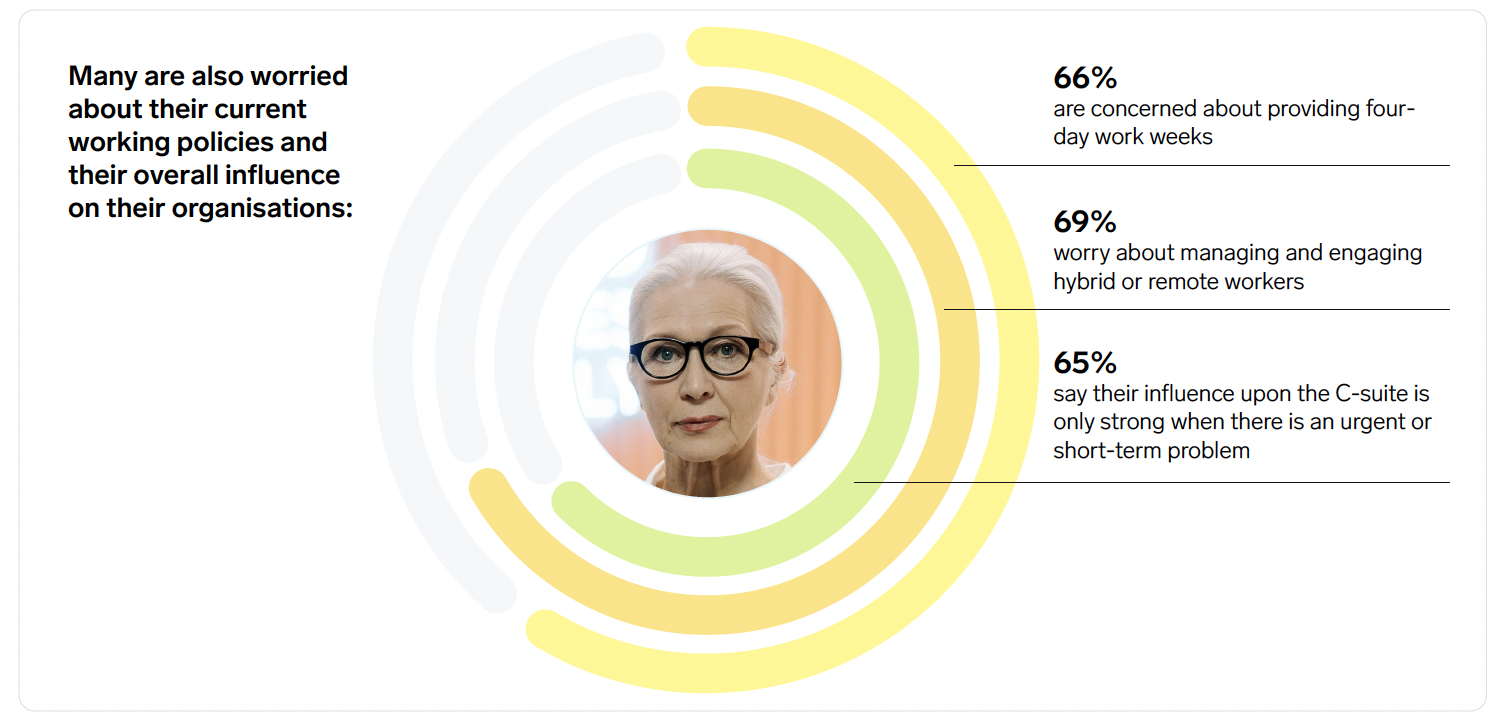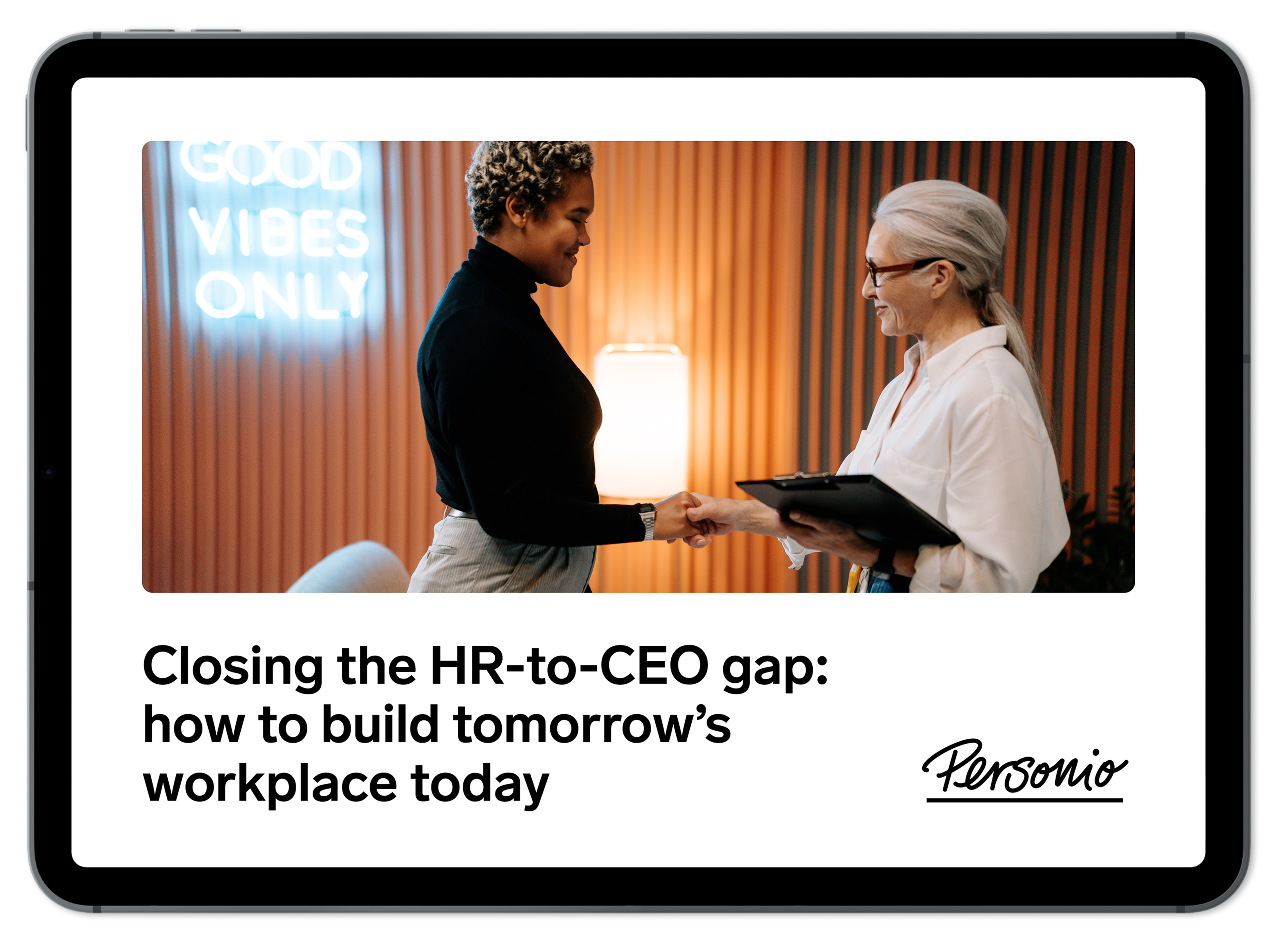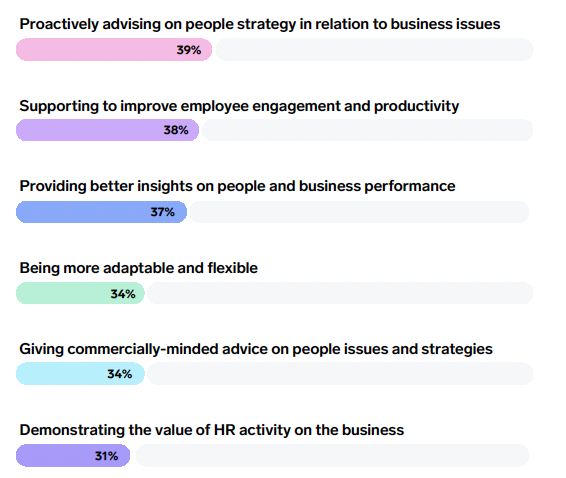6. June 2023
We Asked 2,000+ C-suite Leaders What They Want From HR – Here’s What They Said

It feels like more and more, 2023 is the year that HR leaders such as CHROs are being looked to as the perfect successors for outgoing CEOs. According to SHRM, the Make-a-Wish Foundation, Chanel and General Motors have all recently appointed ex-HR leaders to the head of their company.
Their experience is so valuable that other high-profile companies also put their high-level executives on a developmental rotation in a HR leader role. If some of the world’s leading companies recognise all the expertise that HR possesses, why do only 50% of executives say their HR teams aren’t very involved in business strategy? We spoke to 2,200 C-suite leaders and 4,500 HR managers to find out.
Contents
- 1What were the main takeaways?
- 2HR teams are worried about new working trends
- 3Executives need to involve HR more in strategy
- 4HR need to share metrics that show their value
- 5HR teams don’t feel valued and it’s causing attrition
- 6The C-suite need to provide more for HR teams
- 7AI can help empower but not replace HR teams
- 8HR teams need to focus on C-suite’s goals
- 9What next? Wisdom from Personio’s Chief People Officer
What were the main takeaways?
Don’t have time to read this entire blog post? Don’t worry, we’ve got you covered. These are the main insights that our Europe-wide study uncovered:
HR teams are worried about changing working trends
HR teams need to show their value with the right metrics
HR managers feel undervalued and it may cause attrition
And many more about AI and what each team needs to provide…
1. HR teams are worried about new working trends

Given economic uncertainty, hybrid work and curiosity around four-day work weeks, what employees want (and expect) has vastly evolved. Two thirds of HR managers said their organisation is struggling to keep up. Crucially, they were frustrated that their influence only exists when there’s an urgent problem:
66% are concerned about providing four-day work weeks
67% worry about engaging hybrid or remote workers
65% say their influence upon the C-suite is only strong when there is an urgent or short-term problem
2. Executives need to involve HR more in strategy
While nearly 70% of C-suite leaders say their HR department will be more important to their business in future, 63% would still like to have a better understanding of what their HR team does.
Over half admit that they don’t know how to use their HR team as effectively and strategically as they would like to.
While 63% believe HR’s role serves some value as a strategic partner, 50% say their HR team isn’t very involved with high-level business strategy. Additionally, over half (53%) say they don’t get enough input and advice from HR. You can see how these expectations versus reality compare in the table below:
CEOs think… 70% say HR will be more important to business in future | But… 63% would like to have more understanding of what HR does |
63% say HR’s role serves value as a strategic partner | 50% say their HR team isn’t very involved in business strategy |
40% believe HR should be used as an ongoing strategic partner | 53% say they don’t get enough input and advice from HR |
3. HR need to share metrics that show their value
The 2,000+ C-suite leaders we surveyed shared the following frustrations with their HR: They are slow to respond to changing priorities (28%), adopt new processes (28%) and are not able to connect business strategy to HR issues (26%).
The fix? Nearly 70% of executives surveyed would like their HR team to have a better understanding of business goals. And for this, HR leaders need to be prepared for executive-level discussions that are in sync with overall business strategy.
Having the right data on hand is key here – almost 75% of C-suite leaders say it’s important for HR to deliver metrics, with 71% saying they would like HR to deliver metrics that show contribution to commercial goals.
Here are some of the most valuable reports to share with your C-suite team, according to the leading CPOs we spoke to:
Hiring plan %
Exits <6 months %
Candidate satisfaction
Diverse hiring %
Time-to-hire
Manager engagement score
Net Promoter Score summits
Regrettable attrition %
Employee satisfaction (eSat)
Self-service %
What do 2,200+ C-suite leaders want from HR?

Learn how to close your HR-to-CEO loop and build tomorrow’s workplace today.
Download now
4. HR teams don’t feel valued and it’s causing attrition
Nearly 40% of HR managers say that they are mainly a reactive function, tackling issues as they arise, while 57% say HR is only important when in crisis. Two thirds of HR managers felt valued more during the peak of the pandemic than today, while 60% say their strategic influence has reduced since then.
This shift has far-reaching implications on satisfaction and retention: 50% of HR managers don’t feel HR’s input is valued in their organisation and 70% wish it had a bigger influence. The result is frustration and predicted attrition – 40% of HR managers are planning to leave their job in the next 6-12 months.
5. The C-suite need to provide more for HR teams
HR teams expressed that they would like to see a few key changes from their executives in order to move to a more strategic position. Unsurprisingly, they wished for more resources and support from within the organisation, along with training to fill existing skill gaps for the future. See exactly what they said below:
1. More resources to enable better productivity:
Increased HR budgets (26%)
A bigger team to balance workload (25%)
Better use of technology to free up time (25%)
2. More support from others within the organisation:
More understanding of their role from employees (25%)
More understanding of their role from the C-suite (24%)
Better support from the C-suite (24%)
3. More training to fill future and current skills gaps:
Upskilling in HR data analytics (23%)
Investment in HR specialisms (such as DEI) (22%)
How to do it? Build a business case for these and present the impact that they could have on your organisation to the leaders in your organisation who are able to free up the necessary budget for them.
6. AI can help empower but not replace HR teams
The recent widespread access to AI technology has shifted not only how we think about repetitive tasks but also how we think about the future of roles. We found a major difference in how these two groups feel. Executives are open to the power of AI and its ability to make HR more efficient, but HR teams are worried:
Executives on AI:
“It has a lot of potential to make the HR function more efficient” (68%)
“We intend to incorporate it into our HR in the next five years” (64%)
“The majority of HR tasks could be taken over by AI in the future” (58%)
“In light of recent advances in AI such as ChatGPT, the HR function will be taken over by AI in the future” (58%)
HR leaders on AI:
“The HR function needs more technology to keep up” (73%)
“AI has a lot of potential to free up time to be more strategic” (70%)
“I’m concerned about the impact of AI on jobs and skills needs” (67%)
“I’m worried I’ll lose my job as more of the HR function is automated” (57%)
7. HR teams need to focus on C-suite’s goals

The C-suite wants to see more from their HR function, but they want to see things that remain in step with their own goals. To gain executive buy-in, HR teams need to focus on the goals that executives want to accomplish. Our study identified the following areas where HR could gain a faster route to the table:
Proactively advising on people strategy in relation to business issues (39%)
Supporting to improve employee engagement and productivity (38%)
Providing better insights on people and business performance (37%)
Being more adaptable and flexible (34%)
Giving commercially-minded advice on people issues and strategies (34%)
Demonstrating the value of HR activity on the business (31%)
What next? Wisdom from Personio’s Chief People Officer
Along with advice from C-suite leaders from leading companies such as LearnUpon, TravelPerk and PAVE, you’ll get to see what our CPO Ross Seychell had to say about these interesting findings:
“In my view, this is a great opportunity to do two things: redefine HR’s role and be bold. HR should take the lead with the CEO or executive lead and push for a hard reset, finding where their expertise can benefit the bottom line. After all, misalignment between HR and the C-suite benefits no one — especially not employees.”
Interested in learning more? These are just a taste of the incredibly valuable insights that emerged from our brand new HR study – get your free copy below.

Hannah Popham
Hannah is a Senior Content Marketing Manager at Personio. She loves writing about the ever-changing ways that we work and how they intersect with our lives outside work.

